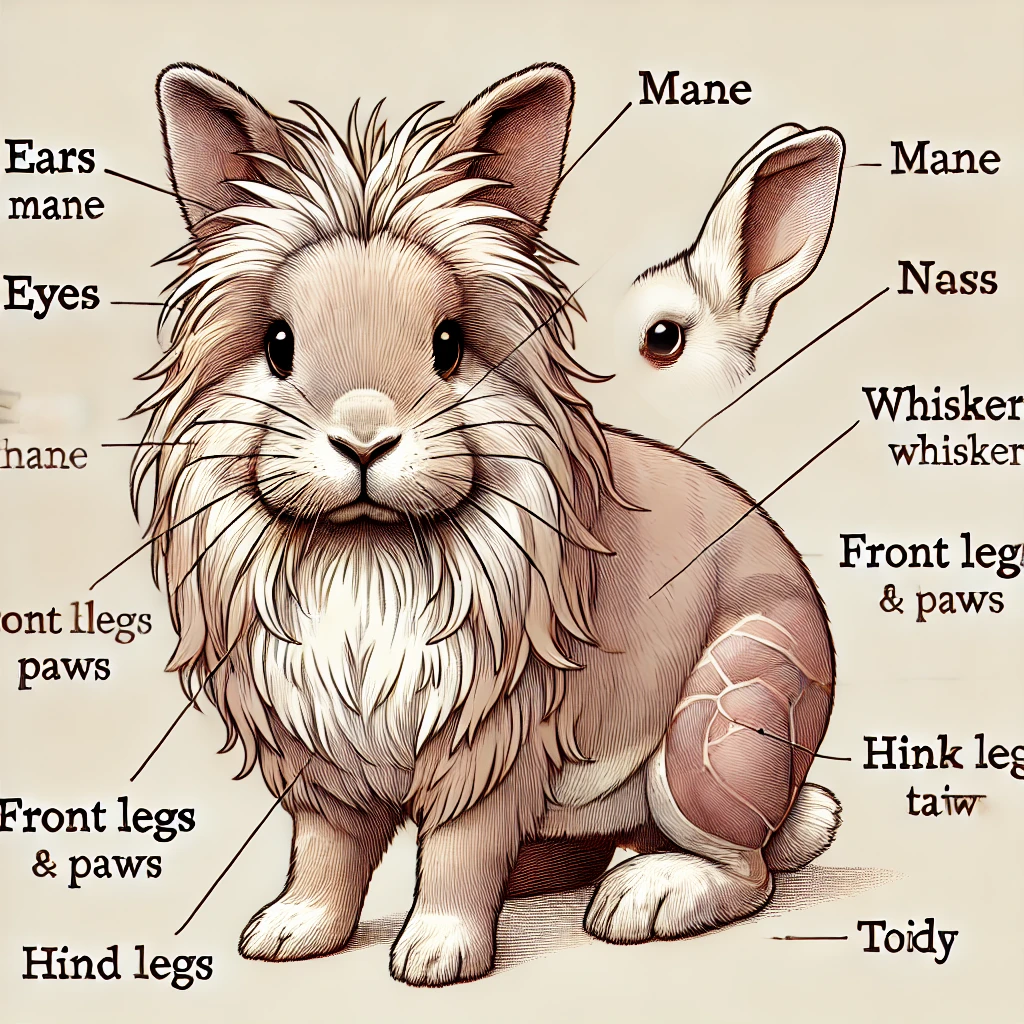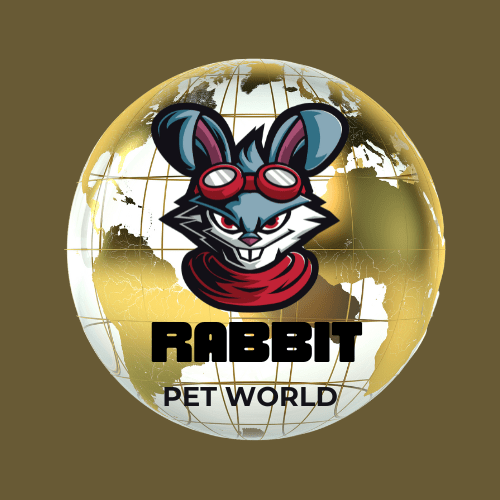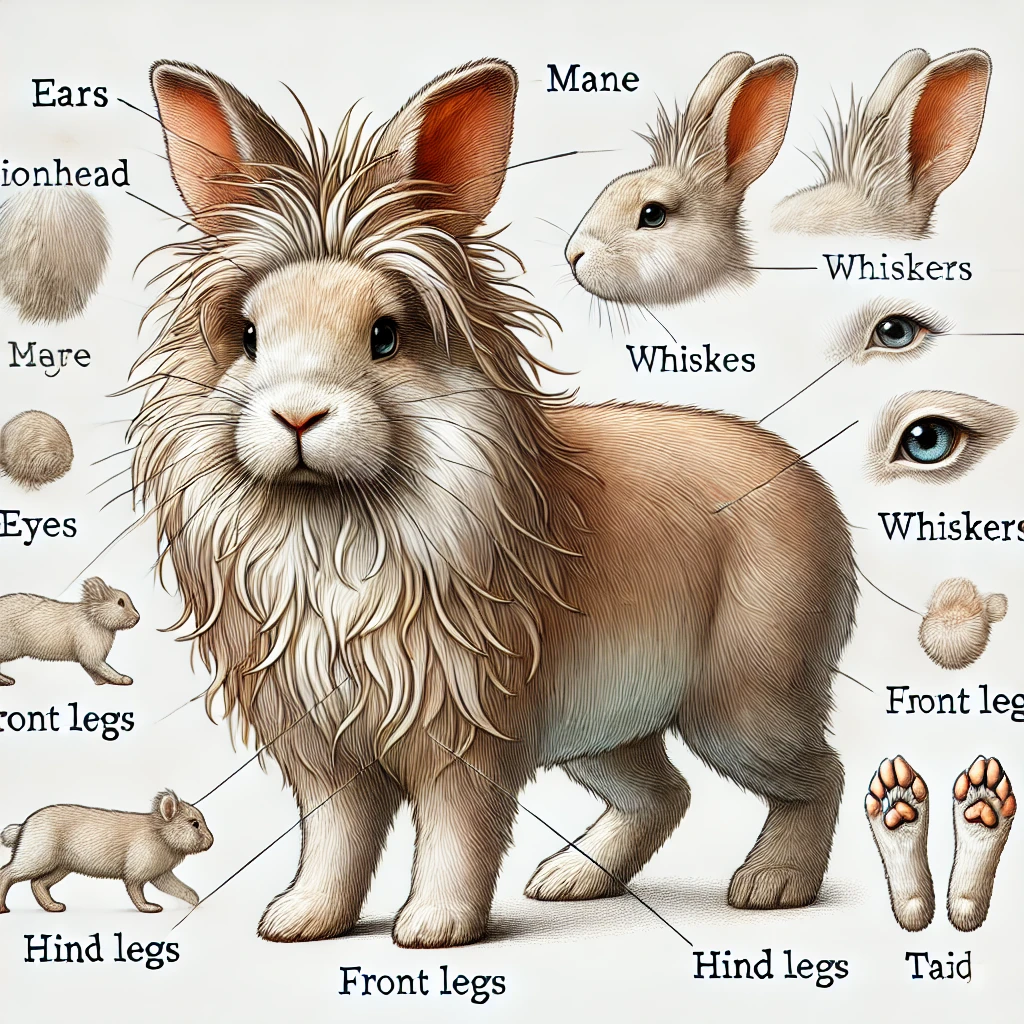The Lionhead Rabbit Body Structure is unique and fascinating, making this breed stand out among pet rabbits. With its distinctive mane-like fur, compact build, and friendly personality, the Lionhead rabbit has captured the hearts of rabbit enthusiasts worldwide. Whether you are considering adopting one or just curious about this fancy breed, this guide will help you understand its physical traits, weight, colors, and lifespan.
- Understanding the Lionhead Rabbit Body Structure:
- Baby Lionhead Rabbit Body Structure: Growth Stages:
- Lionhead Rabbit Characteristics: What Makes Them Unique?
- Lionhead Rabbit Weight and Diet for a Healthy Body:
- Lionhead Rabbit Colors Enhance Their Beauty:
- How Much Do Lionhead Rabbits Cost?
- Final Thoughts: Should You Get a Lionhead Rabbit?
- Frequently Asked Questions:
Understanding the Lionhead Rabbit Body Structure:
The Lionhead rabbit has a compact and upright body type, which means it has a well-balanced shape that is neither too long nor too stocky. One of the most striking features is its mane, a thick ruff of fur encircling its head, resembling a lion’s mane. This distinct trait is due to a genetic mutation called the “mane gene.”

Key Features of the Lionhead Rabbit Body Structure:
- Body Length: 8″–10″ (20.3–25.4 cm)
- Shoulder Height: 5″–6.5″ (12.7–16.5 cm)
- Weight: 2.5–3.75 lbs (1.1–1.6 kg)
- Ears structure: Short, well-furred, 2″–3.5″ (5–8.9 cm) long
- Lifespan: 7–9 years
Baby Lionhead Rabbit Body Structure: Growth Stages:
Understanding the baby Lionhead rabbit’s body structure is crucial for raising a young rabbit. Like all rabbits, Lionhead kits (baby rabbits) are born blind, hairless, and entirely dependent on their mother. Over time, their mane and body shape develop in the following stages:

Growth Stages of a Baby Lionhead Rabbit:
- Birth to 2 Weeks: Completely hairless at birth; fur grows within a week.
- Two to Four Weeks: Eyes open, fur thickens, and mane begins to appear.
- Four to Eight Weeks: More defined body structure; fully visible mane.
- Eight Weeks and Beyond: Rapid growth; weight and body shape stabilize.

Lionhead Rabbit Characteristics: What Makes Them Unique?
Apart from their mane, Lionhead rabbit characteristics include a gentle personality, high energy levels, and trainability. They are smart and can learn tricks, use a litter box, and respond to their names. However, due to their thick fur, they require frequent grooming to prevent matting.
Remarkable Behavioral Traits:
- Playful and affectionate
- Intelligent and easy to train
- Can be skittish if not socialized properly
- Require companionship and love bonding with humans and other rabbits

Lionhead Rabbit Weight and Diet for a Healthy Body:
Maintaining a healthy Lionhead rabbit weight is essential for their well-being. Their compact bodies require a balanced diet consisting of:
- 80% Hay (Timothy hay is ideal for digestion)
- 10% Leafy greens (Romaine lettuce, parsley, kale)
- 5% High-quality pellets (Fortified rabbit pellets)
- 5% Treats (Fruits like apples, bananas—in moderation)
A healthy Lionhead rabbit should weigh between 2.5 and 3.75 lbs, with weight fluctuating slightly based on genetics and diet.
Lionhead Rabbit Colors Enhance Their Beauty:
Lionhead rabbits come in various colors, making them a visually stunning breed. The American Rabbit Breeders Association (ARBA) recognizes multiple color varieties, including:
- Tortoiseshell
- Ruby-Eyed White (REW)
- Black, Blue, Chocolate, Lilac
- Chestnut, Chinchilla, Sable
Each Lionhead rabbit color has its own unique charm, and many breeders specialize in producing specific hues.




How Much Do Lionhead Rabbits Cost?
Suppose you’re wondering about the lionhead rabbit’s price. It depends on factors like breeder reputation, coat color, pedigree, and location. On average:
- Pet-quality Lionhead rabbits: Between $30 and $100
- Show-quality Lionhead rabbits: Between $100 and $250+
Additionally, adoption is a great way to find a Lionhead rabbit at a lower cost, often between $20 and $50.
Final Thoughts: Should You Get a Lionhead Rabbit?
The Lionhead Rabbit’s Body Structure makes them an adorable and unique pet choice. They require proper grooming, a balanced diet, and a safe environment, but their affectionate nature makes them fantastic companions. If you are ready to take on the responsibility, you can find Lionhead rabbits for sale or adoption through reputable breeders or local shelters.
Frequently Asked Questions:
1. Do Lionhead Rabbits Need Haircuts?
Lionhead rabbits, known for their distinctive mane of fur around their heads, do not typically require haircuts like some long-haired breeds do. However, their unique coat does require regular grooming to prevent matting, tangling, and other health issues.
- Grooming Needs: Lionhead rabbits have a double coat, soft undercoat, and a longer, woolly mane. This mane can become matted if not properly cared for. Regular brushing (at least 2-3 times a week) removes loose fur and prevents tangles. During shedding seasons, daily brushing may be necessary.
- Haircuts in Specific Cases: While routine haircuts are not generally needed, there are exceptions. Careful trimming may be necessary if the fur becomes severely matted or soiled. Additionally, some owners opt for a light trim around the hindquarters to prevent fecal matter from sticking to the fur, which can lead to hygiene issues.
- Professional Grooming: If you are uncomfortable trimming your rabbit’s fur, a professional groomer experienced with small animals can help. However, most Lionhead rabbits can be maintained with regular brushing and occasional spot trimming.
2. What Are the Cons of Lionhead Rabbits?
While Lionhead rabbits are adorable and make excellent pets, there are some challenges associated with owning them:
- High Maintenance Grooming: Their long, dense fur requires frequent grooming to prevent matting and hairballs. Neglecting grooming can lead to skin infections or gastrointestinal blockages if they ingest too much fur.
- Health Issues: Lionhead rabbits are prone to specific health problems, such as dental issues (due to their small jaw structure) and gastrointestinal stasis, a potentially life-threatening condition. Regular veterinary check-ups are essential.
- Fragile Nature: Like all rabbits, Lionheads are delicate animals. They can easily injure themselves if mishandled or fall from even a short height. Therefore, they require a safe, rabbit-proof environment.
- Social Needs: Lionhead rabbits are social animals and can become lonely or depressed if left alone for long periods. They thrive with companionship from another rabbit or regular interaction with their human caregivers.
- Space Requirements: They need ample space to hop, play, and explore. A small cage is insufficient; they require a larger enclosure or a rabbit-proofed room to exercise.
- Lifespan Commitment: Lionhead rabbits can live 7-10 years or longer with proper care. Potential owners should be prepared for a long-term commitment.
3. Do Lionhead Rabbits Like Carrots?
Lionhead rabbits, like most rabbits, enjoy carrots, but they should be given in moderation. Carrots are high in sugar and should be considered a treat rather than a staple of their diet.
- Nutritional Considerations: A rabbit’s primary diet should consist of high-quality hay (such as timothy hay), fresh leafy greens, and a small amount of pellets. Carrots can be offered occasionally as a treat, but too many can lead to obesity and dental problems.
- Portion Control: A small slice or two of carrots once or twice a week is sufficient. Overfeeding carrots can disrupt their digestive system and lead to health issues.
- Variety in Diet: While carrots are a popular treat, it’s important to offer a variety of vegetables to ensure a balanced diet. Safe options include romaine lettuce, cilantro, and bell peppers.
4. What do Lionhead rabbits like to sleep on?
Lionhead rabbits, like most rabbits, have extraordinary requirements when it comes to their sleeping surfaces. Providing a comfortable and safe sleeping area is essential for their well-being. Here are some options and considerations for what Lionhead rabbits like to sleep on:
1. Soft Bedding Materials
Lionhead rabbits like to sleep on soft, comfortable bedding that mimics the natural materials they would encounter in the wild. Some popular options include:
- Hay or Straw: High-quality hay (such as timothy hay) or straw is a natural and comfortable choice. It also serves a dual purpose: rabbits can nibble on it throughout the day.
- Fleece Blankets: Usually, most rabbits like Soft fleece blankets. They are warm, cozy and easy to wash. Ensure the fleece is free of loose threads that could pose a choking hazard.
- Towels or Soft Fabrics: Old towels or soft fabrics can also be used, but make sure they are securely placed to prevent the rabbit from chewing and ingesting the material.
2. Paper-Based Bedding
- Shredded Paper or Paper Pellets: Most rabbits like safe, absorbent, and comfortable options. Avoid using ink-heavy or glossy paper, as it may include harmful chemicals.
- Recycled Paper Bedding: This dust-free and eco-friendly option provides a soft surface for sleeping.
3. Natural Fiber Mats
- Grass Mats or Seagrass Mats: These mats are safe for rabbits to chew on and provide a natural, comfortable surface for sleeping. They also help wear down their teeth, which is essential for dental health.
4. Hiding Spots with Bedding
Rabbits feel safest when they have a cozy, enclosed space. Consider providing:
- Hideouts or Rabbit Houses: Small plastic or wooden hideouts filled with soft bedding (like hay or fleece) give your rabbits a secure and comfortable resting place.
- Tunnels: Some rabbits enjoy sleeping in soft fabric tunnels, providing comfort and security.
5. Avoid Unsafe Materials
- Cedar or Pine Shavings: Do not consider these things; they should be avoided, as aromatic oils can harm rabbits’ respiratory systems.
- Synthetic Fluff or Pillow Filling: These materials can be dangerous if ingested and should not be used.
6. Temperature Considerations
- Cool Surfaces in Summer: During warmer months, rabbits may prefer cooler surfaces, such as ceramic tiles or a chilled mat, to sleep on.
- Warmth in Winter: In colder weather, provide extra layers of fleece or hay to keep them warm. You can also use a microwavable heat pad (designed for pets) placed under their bedding, but ensure it’s not too hot.
7. Cleanliness Habit of Rabbits:
- Rabbits are naturally clean creatures and like a tidy sleeping area. To maintain cleanliness, regularly replace soiled bedding to keep their space fresh and comfortable.
8. Observing Your Rabbit’s Preferences
- Every rabbit is unique, and some may have specific preferences for their sleeping surface. Observe your Lionhead rabbit’s behaviour to determine what they like best. For example, suppose they frequently burrow into their hay or snuggle into a fleece blanket. In that case, you’ll know they prefer that material.







